Related Research Articles

The Territory of Wisconsin was an organized and incorporated territory of the United States that existed from July 3,1836,until May 29,1848,when an eastern portion of the territory was admitted to the Union as the State of Wisconsin. Belmont was initially chosen as the capital of the territory. In 1837,the territorial legislature met in Burlington,just north of the Skunk River on the Mississippi,which became part of the Iowa Territory in 1838. In that year,1838,the territorial capital of Wisconsin was moved to Madison.
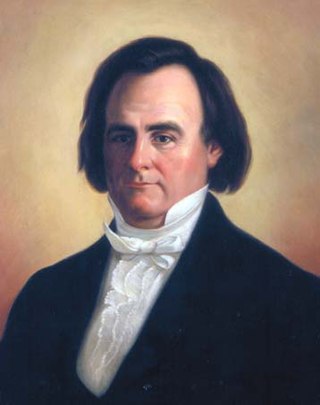
Charles Anderson Wickliffe was a U.S. Representative from Kentucky. He also served as Speaker of the Kentucky House of Representatives,the 14th Governor of Kentucky,and was appointed Postmaster General by President John Tyler. Though he consistently identified with the Whig Party,he was politically independent,and often had differences of opinion with Whig founder and fellow Kentuckian Henry Clay.
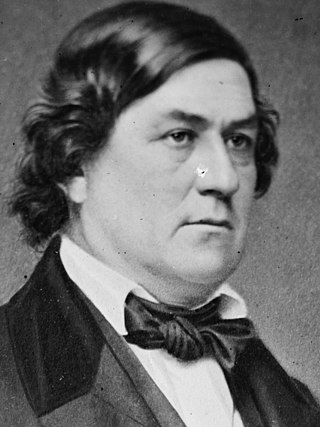
Robert Mercer Taliaferro Hunter was an American lawyer,politician and planter. He was a U.S. representative,speaker of the House (1839–1841),and U.S. senator (1847–1861). During the American Civil War,Hunter became the Confederate States Secretary of State (1861–1862) and then a Confederate senator (1862–1865) and critic of President Jefferson Davis. After the war,Hunter failed to win re-election to the U.S. Senate,but did serve as the treasurer of Virginia (1874–1880) before retiring to his farm. After fellow Democrat Grover Cleveland was elected President of the United States in 1884,Hunter became the customs collector for the port of Tappahannock until his death.

Austin Augustus King was an American lawyer,politician,and military officer. A Democrat,he was the tenth Governor of Missouri and a one-term United States Congressman.
The 1838–39 United States House of Representatives elections were held on various dates in various states between July 2,1838,and November 5,1839. Each state set its own date for its elections to the House of Representatives before the first session of the 26th United States Congress convened on December 2,1839. They occurred during President Martin Van Buren's term. Elections were held for all 242 seats,representing 26 states.

Thomas Allom was an English architect,artist,and topographical illustrator. He was a founding member of what became the Royal Institute of British Architects (RIBA). He designed many buildings in London,including the Church of St Peter's and parts of the elegant Ladbroke Estate in Notting Hill. He also worked with Sir Charles Barry on numerous projects,most notably the Houses of Parliament,and is also known for his numerous topographical works,such as Constantinople and the Scenery of the Seven Churches of Asia Minor,published in 1838,and China Illustrated,published in 1845.

Leverett Saltonstall,was a member of the United States House of Representatives from Massachusetts who also served as Speaker of the Massachusetts House of Representatives,President of the Massachusetts Senate,the first Mayor of Salem,Massachusetts and a Member of the Board of Overseers of Harvard College.
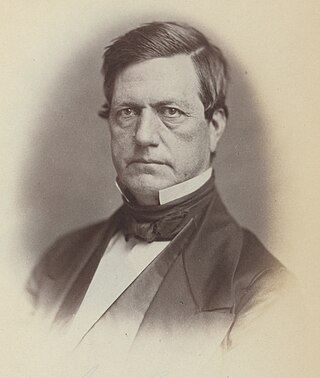
John Bullock Clark Sr. was a militia officer and politician who served as a member of the United States Congress and Confederate Congress. Born in Kentucky,Clark moved with his family to Missouri in 1818 and studied law. He opened a legal practice in Fayette,Missouri,in 1824. He held several positions in the local government in the 1820s and 1830s. Clark was also involved in the state militia,serving as a colonel in the Black Hawk War in 1832 and eventually rising to the rank of major general. In 1838,during the Missouri Mormon War,Clark was the recipient of Governor Lilburn Boggs's infamous Mormon Extermination Order,and was involved in the ending stages of the conflict. He was the Whig candidate in the 1840 Missouri gubernatorial election. Clark was accused of conspiring to commit electoral fraud in the election and as a result almost fought a duel with Claiborne Fox Jackson,later a Governor of Missouri.
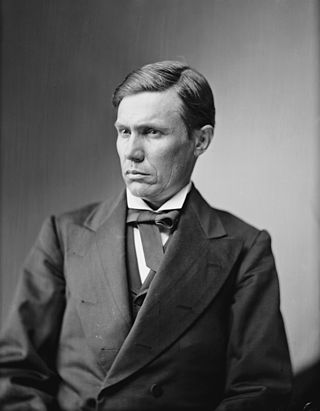
Milton Anthony Candler was an American lawyer,Confederate officer and politician from an influential Georgia family of businessmen and politicians. He served two terms in the U.S. House of Representatives.
Joseph Lawrence was a member of the U.S. House of Representatives from Pennsylvania.
Edward Thomas Branch was a Republic of Texas legislator and Judge,and after the annexation of Texas to the United States,served briefly as Speaker of the Texas House of Representatives

Richard Hickman Menefee was a U.S. Representative from Kentucky. Due to his oratory skill,he was dubbed "the young Patrick Henry of the West." He was presumed the successor to Henry Clay as leader of the Whig Party until his death at age thirty-one.
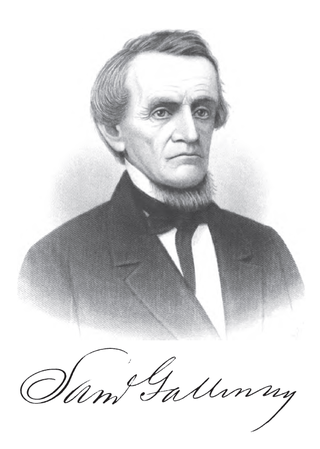
Samuel Galloway was a U.S. Representative from Ohio.

The presidency of Martin Van Buren began on March 4,1837,when Martin Van Buren was inaugurated as President of the United States,and ended on March 4,1841. Van Buren,the incumbent vice president and chosen successor of President Andrew Jackson,took office as the eighth United States president after defeating multiple Whig Party candidates in the 1836 presidential election. A member of the Democratic Party,Van Buren's presidency ended following his defeat by Whig candidate William Henry Harrison in the 1840 presidential election.
Joseph L. Bennett was an early settler of Montgomery County,Texas,who served as lieutenant colonel in the Battle of San Jacinto and the Somervell Expedition. He later served in the Texas House of Representatives from 1838 to 1840.

Branch Tanner Archer was a Texan who served as Commissioner to the United States and Speaker of the House of the Republic of Texas House of Representatives and Secretary of War of the Republic of Texas.
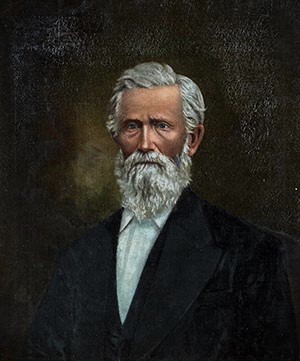
George Washington Baines was an American politician,Baptist preacher,journalist,slaveowner,and educator. He was a co-founder and the third president of Baylor University,while the university was located in Independence,Texas,during the American Civil War.
Joseph J. Anthony (1780?–1837) was a member of the Arkansas House of Representatives. He was killed by John Wilson,the speaker of his legislative chamber,during a debate on its floor.
References
- ↑ Priest, Sharon (1998). Runnells, Jonathan (ed.). Historical Report of the Arkansas Secretary of State. Office of the Arkansas Secretary of State. pp. 212–219. ISBN 9780313302121. OCLC 40157815.
- ↑ "The convention". Arkansas Times and Advocate . January 8, 1836. Retrieved May 8, 2024– via Newspapers.com.
- 1 2 3 4 5 6 "Joseph J. Anthony (Murder of)". Encyclopedia of Arkansas . Retrieved February 16, 2024.
- 1 2 "Trial For Murder". Arkansas Times and Advocate. May 28, 1838. Retrieved February 16, 2024.
- ↑ "Untitled". Arkansas Times and Advocate. December 11, 1837. Retrieved February 16, 2024.